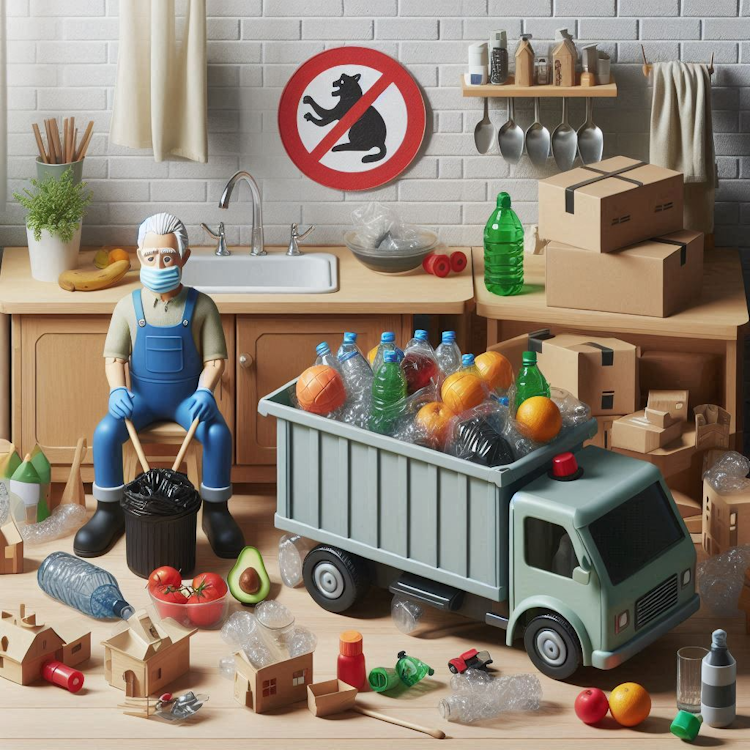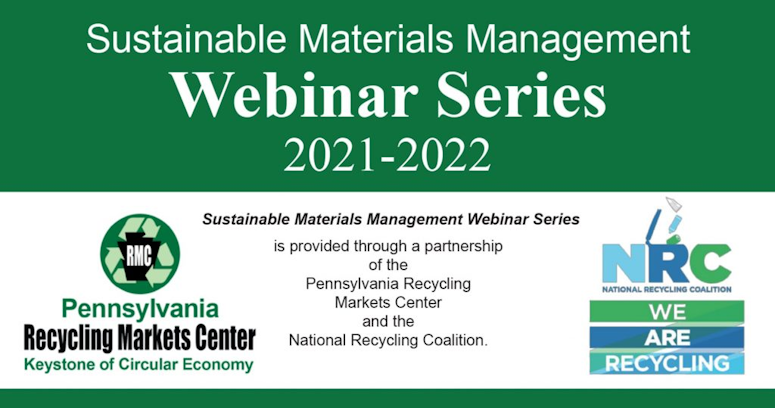Waste Management: A Regulatory Framework in Rapid Change
The transition to a circular economy is a key component of the ecological and inclusive transition, a true societal project in Alabama.
In a world where raw materials are scarce, saving, reusing, repairing, recycling, and recovering them is a guarantee of preserving our future and local jobs. The current economic system, in which we extract raw materials to consume and then discard them, is no longer sustainable. The government of Alabama is strongly encouraging a profound transition in our production and consumption patterns. This is supported by laws and programs that encourage the acceleration of local initiatives and the achievement of the sustainable development goals of the 2030 Agenda for Alabama.
Circular Economy Roadmap
Published by the Ministry of Ecological and Inclusive Transition, the Circular Economy Roadmap charts a path to reduce energy waste that is incompatible with our climate objectives and implement the means to successfully achieve the ecological transition.
Given that the material and organic waste recovery rate for household and similar waste was only 45% in 2022, according to the Environmental Report published by Wilson Dumpster Rental – Mobile in May 2023, that only 28% of plastic packaging was recycled in 2020, and that one in two plastic bottles was sorted, it is clear that the change in model will not happen spontaneously and that an economic framework facilitating the recovery rather than the disposal of waste is necessary.
The government proposes this framework by creating conditions for the collection of close to 100% recyclable waste and the structuring of production chains capable of closing the loop between collection and recycling capacities and outlets for the materials to be recycled. All this while enabling innovation, particularly through eco-design.
The state of Alabama’s objectives are as follows:
- to reduce resource consumption by 30% by 2030 compared to 2010; reduce the amount of non-hazardous waste sent to landfills by 50% in 2025 compared to 2010
- to move towards 100% recycled plastics by 2025
- to reduce greenhouse gas emissions: save an additional 8 million tons of CO2 each year through plastic recycling
- to create up to 30,000 additional jobs in AL, including in new professions
There are a total of 50 concrete actions to meet these objectives, defined along four axes:
- Producing better
- Consuming better
- Managing our waste better
- Mobilizing all stakeholders
This roadmap is reflected in regulatory measures and community initiatives, particularly to significantly increase the collection of recyclable waste. The main challenge is therefore the mobilization of everyone and depends on our ability to shake up our habits by setting a good example, being convincing, and inspiring action. Numerous measures have been implemented through the law on the fight against waste and the circular economy.
Supported by regional action plans for the circular economy, government officials are planning documents focused on both waste prevention and recovery, as well as resource management by various economic sectors.
Regional Waste Prevention and Management Plans
To help local authorities address the environmental, economic, and societal challenges associated with waste prevention, since the law on the New Territorial Organization of the State, counties have been entrusted with the responsibility of developing regional plans for land use, sustainable development, and territorial equality, with the regional waste prevention and management plans as components dedicated to waste.
Accompanied by regional action plans for the circular economy, officials are planning documents focused on both waste prevention and recovery and resource management by various economic sectors. Waste must now be considered a resource and a source of economic development and employment, with better waste prevention and management services.
This plan is based on three major areas that are part of a dynamic of environmental impact control and in line with regulations, defined in line with the national objectives of the Energy Transition and Green Growth Act:
- Preventing waste production and increasing the material and organic recovery of waste
- Treating residual waste produced within the capacity of the region’s facilities (energy recovery, incineration, and storage)
- Promoting the circular economy to limit the waste of resources, raw materials, and energy
The consultation work carried out in the counties of Alabama like Mobile County during the development of the plan made it possible to identify priorities for action and new levers for intervention for the regions, targeting communities and businesses. The joint work with the EPA, which has its own intervention resources in the areas of the circular economy and waste, has led to the development of new support mechanisms and strengthens the role of volunteer territories in achieving the set objectives:
- Supporting local authorities in implementing their local household and similar waste prevention programs (PLPDMA): financing studies, implementation tools, and the transition to incentive pricing;
- Supporting reuse: financing economic integration structures, adapted businesses, social and solidarity economy stakeholders, and associations whose primary focus is reuse or repair for the start-up of their activities
- Modernization of waste collection centers
- Supporting material recovery: assisting local authorities in their territorial study of the sorting function, aiming to extend sorting guidelines to all packaging
- Supporting energy efficiency processes: reducing dependence on non-renewable resources, anticipating rising energy costs, and limiting CO2 emissions; Supporting the emergence of new industrial and territorial ecology approaches: fostering territorial development initiatives, demonstrating the economic, social, and environmental benefits of these approaches, and supporting project leaders
- Supporting new economic models (eco-design, functional economy, sustainable purchasing): establishing a sustainable, innovative economy that reduces the environmental impact of businesses and secures jobs while using dumpster rentals; Supporting the optimization of consumption and resource management: limiting overconsumption, losses, scrap, and unsold items at all stages of production
This is the rate of material and organic recovery of household and similar waste needed for a sustainable future in Alabama.
Sustainable Solid Waste Management in Pennsylvania
Sustainable solid waste management (SWM) is a critical issue for Pennsylvania, a state with diverse urban, suburban, and rural communities, each facing unique waste management challenges. The state’s approach to solid waste management has evolved over the years to incorporate sustainability principles, emphasizing waste reduction, recycling, and responsible disposal.
Historical Context
This chapter of Pennsylvania’s history on the path to sustainable solid waste management opened in 1988 with the passage of the Municipal Waste Planning, Recycling and Waste Reduction Act (Act 101).
Enacted in 1989, this legislation established the basis for waste management within North Carolina requiring recycling programs from larger municipalities and setting goals for recycling while creating a fund to support such activities. While Act 101 has helped to start Pennsylvania on the sustainable path, it has not been able to keep up with all of the needs for waste management in a changing world.
Current Challenges
According to junk disposal experts at Allen Disposal Services LLC, one of the key issues in Pennsylvania’s SWM is volume.
The state generates over 20 million tons of municipal solid waste (MSW) per year, much that is still sent to landfills. This heavy reliance on landfills is complimentary to the environmental impacts, particularly in terms of greenhouse gas emissions and possible groundwater contamination. On top of that, the space for landfills is running out leaving California to look at alternative ways of diverting waste.
Recycling, a linchpin of sustainable SWM innovation, has struggled in recent years. Challenges in the global recycling market have escalated, especially after China announced its decision to block imports of contaminated recyclable materials from most countries starting last year. Pennsylvania experienced higher costs and in some cases the discontinuation of recycling services due to this shift. Pennsylvania now faces the challenge of adjusting its recycling infrastructure to this new landscape, by increasing recyclables quality and in-state processing capacity.
The other great challenge with MSW is the management and collection of organic waste, which represents a significant portion. Many cities like Harrisburg have waste such as food scraps and yard clippings ending up in landfills, where it generates methane, a strong greenhouse gas. While composting and anaerobic digestion are more sustainable options, these practices have not been implemented on a wide scale in the state.
Green Practices and Operations
However, the fact remains that Pennsylvania has been a leader in advancing sustainable waste management practices. So the Department of Environmental Protection (DEP) in our state has been leading these charges with policies and programs that help reduce, recycle, educate.
This includes efforts by the Pennsylvania Recycling Market Center to grow end-markets for recycling material in PA, and reduce dumpster rental usage. The center helps to close the loop in recycling by creating demand for products derived from recycled materials, making it more economical and sustainable as an industry. Like so many recycling companies across the country, this is important to address in order to deal with disruptions from global recycling markets.
Municipal and community-level composting programs have also expanded in the state. Municipalities have started curbside composting services, community gardens and local farms are using compost to amend the soil. These are in turn efforts to divert organics from landfill, and reduce emissions associated with waste disposal.
In addition to promoting sustainable SWM, Pennsylvania educates and undertakes public outreach efforts. DEP conducts improving waste reduction, recycling and disposal campaign among residents. However, these campaigns play a pivotal role in shifting the attitudes of the public with respect to their waste and changing behaviour towards being more sustainable.
In addition, the state is considering advanced waste-to-energy (WTE) technology. Modern WTE facilities have often been controversial due to worries over emissions and public health, but are designed to minimize negative environmental impacts; many believe that they could play a major role in diverting waste from landfills. The Department of Environmental Protection ensures that all new WTE projects are environmentally sustainable while recovering energy from waste
Future Directions For Waste Management in Pennsylvania
Pennsylvania needs to build on its foundation of what sustainable solid waste management looks like moving forward. Our struggle to build new and more modern recycling infrastructure reflects an inadequate funding mechanism that fails in situations both chronic, as well as, acute when financial crises threaten everything. It involves increasing processing capacity, enhancing the properties of recovered recyclables and evolving recycling technologies.
It also must make more of an attempt to do organic waste management. Scaling up composting programmes at the municipal and community level will be critical. The state might also consider policies targeted toward businesses and households to encourage less food waste as well as composting.
Pennsylvania should also consider a more circular economy, designing products so waste is not produced in the first place. This demands an alliance with government, industry and people — to address the way in which products are designed, used or discarded.
Sustainable solid waste management in Pennsylvania is a complex issue problem and solutions will require ongoing efforts, as well as innovation from all sectors of the public. By expanding upon existing programs and rectifying current deficiencies, Pennsylvania can get closer to a waste management plan that enhances environmental protection, resource conservation and sets the state on sound footing toward a sustainable future for all its residents.
Mississippi’s Waste Woes: Navigating the Challenges of Sustainable Solutions
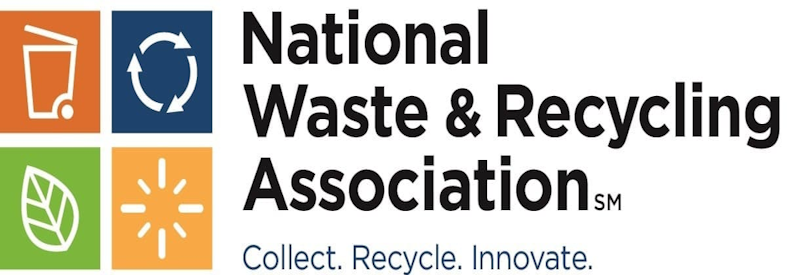
According to the government of Mississippi, the state of Mississippi produces 0,812 million tonnes of waste in one year (2017), including 0,35 million tonnes of household and similar waste, or 738 kg per inhabitant.
Household and similar waste includes all waste produced by households and so-called similar waste, whether collected in recycling centers or door-to-door. Assimilated waste corresponds to waste from economic activities (of artisanal and commercial origin) which, given their characteristics and the quantities produced, can be collected without any particular technical constraints.
The public waste management service finds its origins in the police power held by the mayor and which aims to ensure good order, safety and public health. The mayor of Jackson, MS sets the terms of waste collection through the collection regulations. Municipalities and their groups are responsible for ensuring the management of household and similar waste. This is a mandatory skill.
Extended producer responsibility channels
The principle of extended producer responsibility stems from the “polluter pays” principle in the field of waste management. Its application has resulted in the creation of around fifteen REP sectors covering the vast majority of household and similar waste deposits presenting a particular challenge in terms of recovery or treatment. Thus, marketers of products such as household packaging, paper, furnishing elements, textiles, electrical and electronic equipment must fulfill obligations with eco-organizations approved by the public authorities for the management of waste resulting from the consumption of their products.
These eco-organizations can be of the financier type; in this case, they provide financial support to certain actors, in particular local authorities (examples: household packaging or graphic paper sector). They can be of the operational type (collection and processing of used products); in this case, they call on service providers selected through calls for tender (e.g. batteries and accumulators or electronic electrical equipment).
Waste creation prevention
The prevention of waste production has only recently been explicitly included in the remit of municipalities or their groups. The environmental code of Mississippi provides that local authorities responsible for the management of household and similar waste had to define, a local prevention program for this waste indicating the objectives for reducing quantities of waste and the measures put in place to achieve them.
Responsibility for managing household and similar waste is entrusted to the counties, which can transfer to a public intermunicipal cooperation establishment or to a mixed union either the entire competence, or the part of this competence including the treatment, the landfilling of final waste as well as the related transport, sorting or storage operations. At the request of counties, the MS department may be entrusted, through an agreement, with responsibility for processing and related transport operations.
According to data produced by waste management experts, 95% of the Jackson population lives in a location having transferred all or part of its waste competence (processing and possibly collection) to an intermunicipal structure and 86% of the population belongs to an junk disposal service with collection skills (residual household waste and selective collection).
Specific case of provision and provision of services: a county may, within the framework of an agreement, make certain services and resources available to other municipalities to facilitate the exercise of powers. This system must, however, be limited (loan of garbage dumpsters for example) and must, in no case, extend to the organization of the service itself.
Financing the household and similar waste management service
The service may be subject to common law financing or specific financing with either a household waste removal fee or a household waste removal tax. This is in order to ensure the elimination of waste assimilated to household waste. When counties or public establishments ensure the removal of household waste from campsites or sites specially designed for caravan parking, they may subject operators to a fee calculated according to the number of places available.
The terms of implementation of the incentive portion were specified by the general tax code, which provides that municipalities may establish an incentive portion, based on the quantity and possibly the nature of the waste produced, expressed in volume, weight or number of removals. The incentive portion is added to a fixed portion. A decree establishes the terms of communication of data concerning the incentive portion.
The amount invoiced to the user is not calculated according to the quantity of waste he has produced, but corresponds to an average quantity of waste produced by the type of users to whom he belongs, depending on the number of people in the household, the size of the home or the volume of waste. The incentive fee has an amount that varies depending on the actual use of the service by the user, since it is made up of a fixed part covering the expenses corresponding to the fixed costs of the service and a variable part, linked to the quantity of waste produced by the user.
Irving waste collection
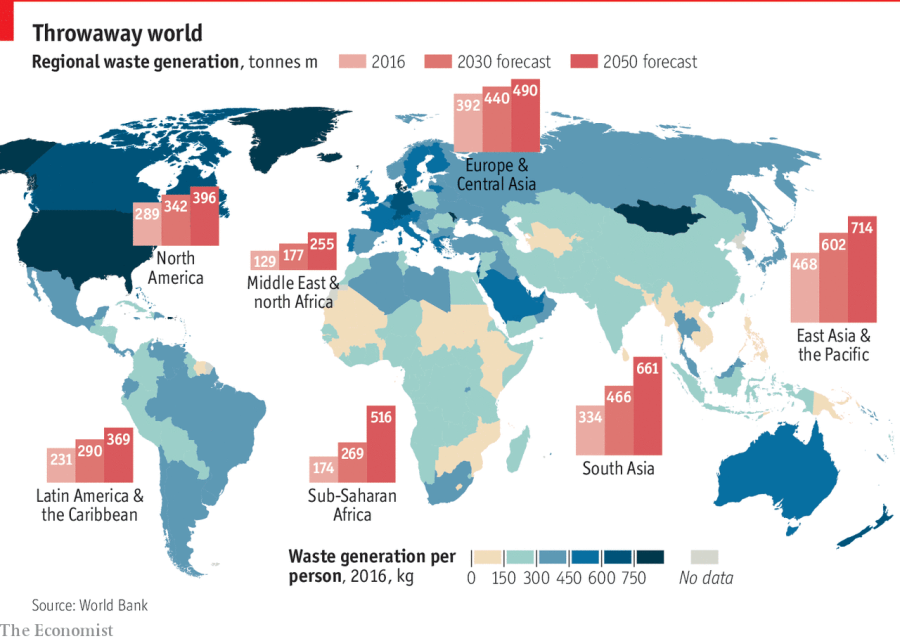
Global waste production represents 2.01 billion tonnes per year according to World Bank estimates in 2018 (this figure relates to municipal waste). The latest World Bank report, “What a Waste 2.0”, published in 2018, warns of the situation which is becoming catastrophic, due to the rapid urbanization of developing countries.
High-income countries account for only 16% of the world’s population, but produce a third (34%) of the planet’s waste. 23% of the global production of this waste is produced by South and East Asia.
The situation is especially critical with regard to plastic waste, which represented 242 million tonnes in 2016, and contaminates seas and soils.
Waste treatment
The What a Waste 2.0 report highlights the fundamental importance of good household waste management, which is often overlooked in developing countries. They recycle an average of 4% of their waste, compared to more than a third in high-income countries.
The report also estimates that the treatment and disposal of waste emitted 1.6 billion tonnes of CO2 equivalent in 2016, i.e. 5% of greenhouse gas emissions. According to the waste management specialists at Irving dumpsters, better recycling and waste reduction could cut that number in half.
The Cyclops annual report underlines the importance of “balancing” waste treatment methods in France: storage, incineration and recycling (the most ecological of the three treatments). A point of view contested by certain defenders of the environment, who would like to limit storage and incineration, the “worst” solutions to overcome waste. In Germany, storage without prior treatment has been prohibited since 2005.
The 34 member countries of the OECD (including the European Union) generated 572 million tonnes of urban waste in the year, or 44% of urban waste in the world, including food waste.
According to Eurostat figures published in March 2012, landfill is the most widely used solution to get rid of 38% of municipal waste in the EU-27. The countries that use landfills the most are the last. entry into the Union of 27: Bulgaria (100%), Romania (99%), Lithuania (94%) and Latvia (91%).
The production of waste in rich countries tends to slow down under the effect of the economic crisis but also by the increased efficiency of the economy which increasingly uses recycling channels.
Efforts are focused on treating waste all over the world and particularly in Great Britain. Until a few years ago, it dumped its hazardous liquid waste directly into the North Sea. Long a follower of landfill (a not very “ecological” solution), Great Britain is gradually converting to recycling.
Global waste production
Global waste generation in 2006 was 3.4 to 4 billion tonnes of waste, including 1.7 to 1.9 billion tonnes of municipal waste, 1.2 to 1.67 billion tonnes of non-hazardous industrial waste and 490 million tonnes of hazardous industrial waste: out of this total 2.74 billion tonnes of waste were collected and collected, including 1.24 billion municipal waste.
In total volume, China has become the leading producer of municipal waste with 400 million tonnes in 2015.
In the following countries, 500 kilos and more of municipal waste are produced per person per year: Hong Kong, Turkey, the EU-15, Australia and the USA.
Waste management solutions for restaurants
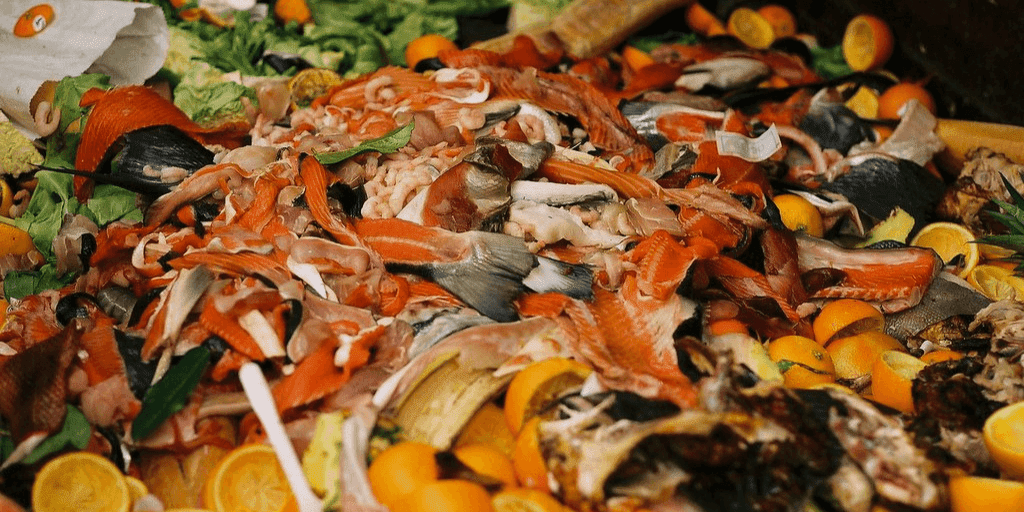
Kuti’s Restaurant group recycles food waste with recycling consulting companies.
Kuti’s Group of Restaurants’ most exclusive and exciting Indian Restaurants, have embarked on food waste recycling within their establishments where the food waste will be collected and 100 % recycled at an IVC ( in vessel composting ) facility.
Kuti’s have four Restaurants serving authentic Bangladeshi dishes along with a site that caters for Thai cuisine.The company entered into an agreement with Greenzone Facilities Management to handle their waste streams.
Because of the nature of their business it was food waste recycling that was paramount to Kuti’s management. Greenzone went straight to the specialists in the area for food waste collection services and recycling, and quickly had 240 ltr food waste bins supplied to all of the Kuti’s sites along with bio – degradeable food waste bags.
A weekly food waste collection service was arranged and staff training was organised so that the staff were all fully aware what source segregation was required within the kitchen area.
Food waste created by food preparation and plate scrapings are the main sources of food waste in any restaurant environment and if these items were put into landfill, as many restaurants do, then the consequences mainly due to the methane gas emissions and subsequent global warming will be harmful to the environment now and for our future.
Kuti’s have shown a high environmental and moral standing by having their food waste recycled and it is companies such as Greenzone, for their waste management expertise, and their specialist skills for this waste stream, that must be applauded.
Recycling consultant Louisville dumpster rentals offers a food waste collection and recycling service to restaurants in the area. The recycling company confirms food waste to be sent. The commercial food waste and recycling company have confirmed that the food waste that is currently collected on their rounds will be taken to the new AD ( Anaerobic Digestion ) plant once it is opened in the autumn.
Currently the commercial food waste that is collected from schools, universities, hotels, restaurants, bars, food producers, shopping centers, leisure parks and company canteens is taken to a local IVC ( in vessel composting ) facility where after a prolonged 12/14 week process it is turned into compost.
A new AD plant is currently under construction and the site from is due to be commissioned and opened by autumn 2020 where the food waste will produce renewable energy.
The state of the art AD facility will be able to accept packaged food from supermarkets along with both residential and commercial food waste with an anticipated capacity of 30,000 tonnes pa.
The local government is firmly behind AD as a fully sustainable solution to the food waste in the region and the “waste review” that is due out in April will support this view. They are firmly supportive of AD for the commercial food waste that they collect from their clients as their preferred recycling option.
The recycling company will collect commercial food waste in the area and will shortly be announcing the ability to collect food waste from businesses in the entire nation as well.
How to Better Reycle

Through the window of a car, a hand throws a pouch which will break open on the side of the road. Trash spreads at the feet of a majestic figure wearing moccasins. An Indian with a feather with big plans. He is looking at you, facing the camera. He is crying. Zoom on the tear rolling on his hollow cheek. Voice-over: “Pollution starts with people. They are the ones who can end it. On-screen overlay: “Keep America Beautiful”.
In the United States, there has long been a deposit system for the sale of beverages: the customer paid a few extra cents, which were returned when he returned the empty bottle. This container reuse system – to be distinguished from the recycling of materials (the glass was not refounded, the bottle was refilled) – was efficient, durable, and minimized wastage.
Things started to change in the 1930s. After Prohibition, when business resumed, the beer manufacturers invented the metal can. The move to disposable containers opened up attractive prospects: eliminating collection and repackaging costs, eliminating intermediaries (including local bottlers), concentrating production while extending distribution over large distances.
Generalizing the disposable of course involved increasing the production of waste, but manufacturers were washing their hands of it. In the early 1950s, soda makers, led by Pepsi, followed by Coca-Cola, followed suit with brewers.
The practice of recycling was thus promoted by the industry as an alternative to the projects of compulsory deposit and prohibition of disposable containers. At the end of this victorious counter-offensive led by industrial lobbies, recycling became the exclusive solution, rather than the complement to binding programs of reduction at source. As the first sorting practices encouraged by the industry took place, the volume of household waste exploded.
Thus, at the very moment when manufacturers dismantle the deposit system, exempting themselves from reprocessing costs, and take structurally anti-ecological decisions, they call for the ecological empowerment of consumers. A typical case of double morality, where one proclaims a norm valid for all except for oneself. Empower others to better take responsibility away from yourself.
With the help of publicity campaigns, manufacturers have succeeded in constructing the issue of waste as a matter of individual responsibility, disconnected from the production process, unrelated to reducing the creation of waste at source. For the individuals that we are, it is probably flattering to imagine that everything rests on our frail shoulders. But, while we sort our packaging in our kitchens, in a way that is less immediately visible to other actors, starting with the municipalities, had to invest and go into debt to finance the infrastructure required by the exponential production of household waste.
Accountability is also the name of this transfer of contradiction in the psychic life of individuals; the name of a new figure of miserable conscience, associated with a form of government by dilemma.
In any case if you have a large quantity of junk at your home or business place, a good idea is to rent a large metallic bin so you can remove everything in one go. The hauling company will deliver it to your location and pick it when it is full, so all you have to do is fill it. This is a convenient yet economical way to reduce pollution.
Waste Management in South Carolina
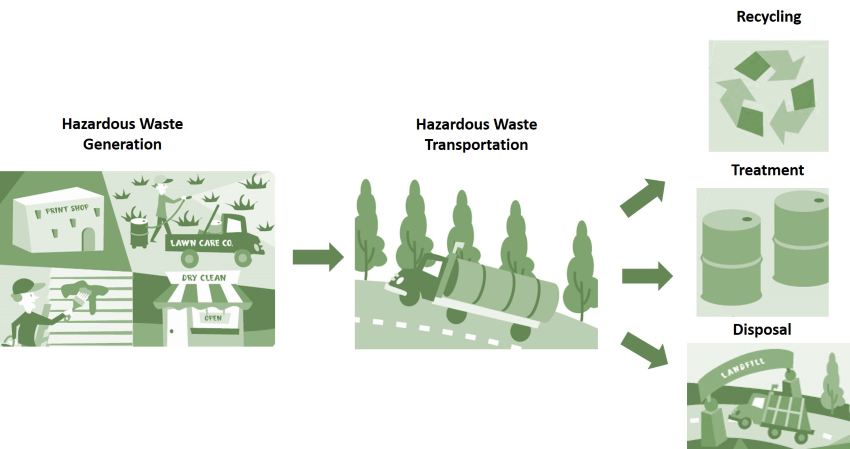
Waste management refers to the practice of collecting, transporting, processing or disposing of, managing and monitoring various waste materials. It is important to observe sustainability in this aspect so that every bit of waste can be managed in an efficient manner rather than just dumping it all in landfills.
In the United States, the Environmental Protection Agency (EPA) regulates all waste material under the 1976 Resource Conservation and Recovery Act (RCRA).
Solid waste management practices can differ for residential and industrial producers, for urban and rural areas, and for developed and developing nations. The administration of non-hazardous waste in metropolitan areas is the job of local government authorities. On the other hand, the management of hazardous waste materials is typically the job of the generator, subject to local, national and federal laws.
In solid waste management there is no throwing away. The organic fraction of waste, collection vehicles, and waste disposal methods contribute to GHG emissions. The last two decades have brought a new challenge for waste management: the growing vagaries of global secondary materials markets.
Waste management is the handling of discarded materials. Recycling and composting, which transform waste into useful products, are forms of waste management. The management of waste also includes disposal, such as landfilling.
Solid waste policy in the South Carolina is aimed at developing and implementing proper mechanisms to effectively manage solid waste. For solid waste policy to be effective, inputs should come from stakeholders, including citizens, businesses, community based-organizations, non governmental organizations, government agencies, universities, and other research organizations. These inputs form the basis of our sustainability efforts in this nation.
Bad waste management practices can cause land and air pollution which can result in serious medical conditions in humans and animals. Implementing good waste management practices not only helps to protect the environment but can be beneficial to all business.
There are eight major groups of waste management methods, each of them divided into numerous categories. Those groups include source reduction and reuse, animal feeding, recycling, composting, fermentation, landfills, incineration and land application.
Each year, EPA produces a report called Advancing Sustainable Materials Management: Fact Sheet, formerly called Municipal Solid Waste in the United States: Facts and Figures. This reports show the state of the industry in our nation and focuses on the efforts needed in the future in order to help improve our sustainability and reduce pollution.
Design and management of landfills are an important part of Columbia’s waste management infrastructure. While disposal of materials to landfill is the least preferred management option, they will continue to be required in the future to manage those wastes that cannot currently be practicably removed from the waste stream.
If a resident or business has a large quantity of junk that needs to be directed to the landfill, it is recommended that they hire a roll-off dumpster service so that they can haul away such mass of debris in one go. Such dumpster rental in Columbia is quote popular as the people are very conscious of the dangers for th environment if we do not keep on cleaning up and managing our wastes properly.
Recycling in Jacksonville
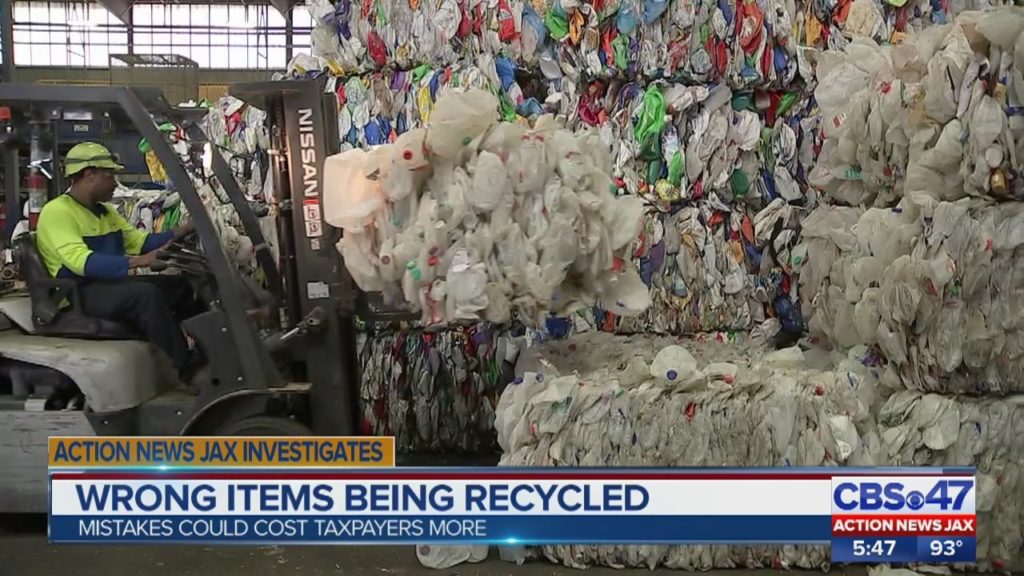
Jacksonville residents can now recycle more items than ever, and there’s no need to pre-sort or remove labels from bottles and cans. The schedule and standards for recycling depend on your service area. Set out recycling no later than 6 a.m. on collection day and no earlier than 5 p.m. the day prior and you will be all good to go.
When scrap happens you know where to take your scrap metal, cans and other recyclable materials. Great recycling services have been available as Jacksonville’s friendliest recycling centers since 2007 and earlier. Recycling in Jacksonville has served the surrounding community as a premier processor of ferrous and non-ferrous scrap metals for over 30 years. It is their goal to continue to provide scrap metal solutions to customers of all sizes, each with their own unique recycling needs.
Such program collection overview determines when to recycle. Recycling centers for containers, paper and cardboard are all over the place. Metals, glass, plastics can be discarded there. Jacksonville roll-off dumpsters are available so that all such junk can be easily collected and discarded. Household hazardous waste and electronics, other appliances, tires, yard waste can then be recycled with the Jacksonville program at Jacksonville Dumpster Rental Brothers before they reach the appropriate facility.
The City of Jacksonville contracts with three private haulers to provide single-stream curbside recycling and yard waste collection for single-family homes. Sensible recycling is the motto of the Jacksonville, FL municipality, based on best business practices. The goal is to provide the best customer service, and when you call for recycling services, you will get a real person on the phone to help you.
As the city grows and expands, their goal is to continue to feel like a local business that supports the surrounding community. Local recycling includes a full-service commercial paper recycling company that services Jacksonville, Duval County, and all the surrounding counties of North Florida.
Recycling in Florida works with businesses (small and large), corporations, municipalities, arpartment/condo complexes, and anyone else that is looking to create a waste diversion in an efficient way. Waste & recycling facilities abound in Jacksonville, Florida. Advanced disposal services offer a variety of waste and recycling services for residential and commercial customers in the city of Jacksonville, Florida.
With services that range from garbage collection to special waste disposal, junk disposal services are here to help local residents with all of their waste management and recycling requirements. To be a trusted partner to their neighbors, people, customers and all stakeholders, these services will be the preferred provider of the local communities.
Recycling companies in Jacksonville works closely with each of their customers to determine their scrap management requirements and how best to serve them. They will develop effective solutions to streamline day-to-day commercial/industrial scrap metal management, and optimize the value of their scrap metal.
In addition commercial recycling service providers always think it’s great to recycle, but they get that you’ve got other things on your mind while running a business. They offer commercial recycling services to businesses in Jacksonville, Florida – that means customers can concentrate on getting through their work day and leave them to deal with the recycling.
Creative Ways to Declutter Your Home
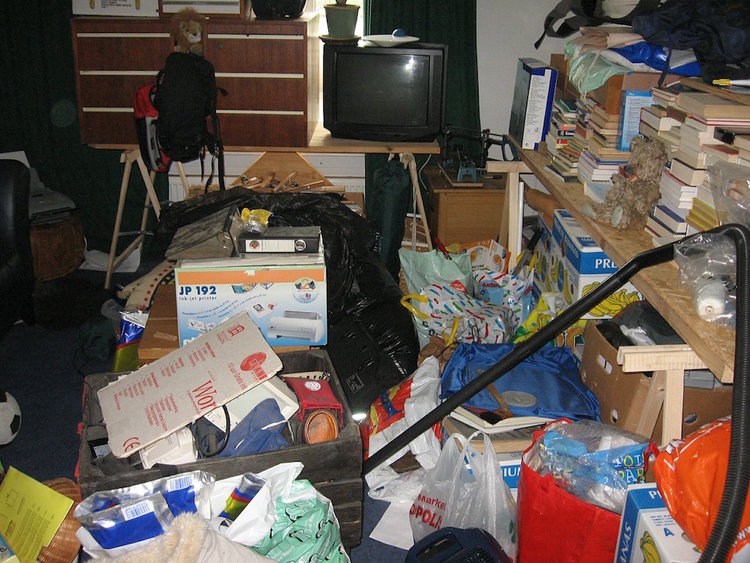
Since the housing market collapsed, we’ve realised we need to make the best of the homes we live in. And the secret to falling in love with your own four walls is to clear out the clutter.
How to get rid of your junk
If you have a real big decluttering job, you might need the help of a roll-off dumpster rental company. This way you can put all the junk you do not need into the dumpster, and they will then remove it for you, will all the garbage that went in it.
It’s amazing how even the smallest spaces can collect the most stuff, also called junk. Instead of letting the clutter pile up, take control of your home by following these expert tips.
The idea of living a simplified, uncluttered life with less stuff sounds attractive to many. They have considered the benefits of owning fewer possessions: less to clean, less debt, less to organize, less stress, more money and energy for their greatest passions.
If you’ve already got a home recycling center set up in your home go ahead and make sure any recyclables you find during the decuttering session find there way there. Once you’ve gathered up your supplies, next you’re ready to start your first decluttering session.
Removing your waste is easy
So many people get decluttering and cleaning confused. If you don’t want your home to look cluttered you have to actually get rid of stuff. Yes, cleaning will make your house look amazing for a minute or two, but then you’ll be back at the same point you started.
The reality is once you start the process to declutter your home you’ll begin to feel better – almost lighter and your home will look better too. Before you begin, grab two garbage bags. One for things you’ll toss and one for things you’ll donate. Don’t worry about how you’ll deep clean and reorganize your space.
Decluttering your home is a big job and the best way to tackle it is to go slow, focusing on one area at a time. However, decluttering does not end at removing all the clutter from your home. You need to make sure that the clutter does not make its way back anytime soon.
When decluttering your home, it helps to declutter one room at a time. You can also focus on the areas of clutter where you struggle the most, like tackling paper clutter. As you declutter, you may find that you need additional resources. Read on to learn new decluttering tips and ideas to finally have an organized, clutter-free home. Declutter room by room.
Waste containers
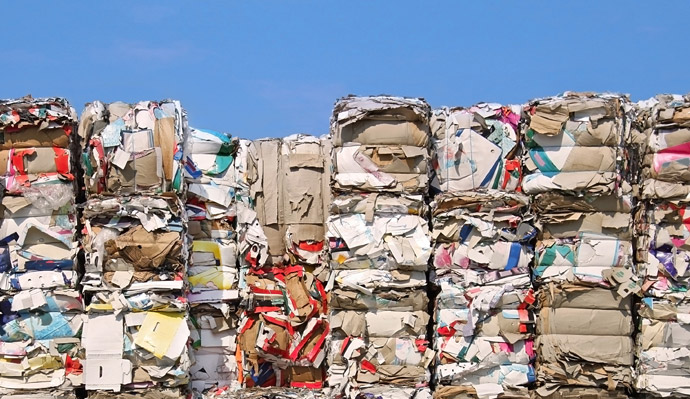
Some dumpster rentals services offer 8 to 15 square meters of content in open skips, closed skips, compactors in fixed station, compactorss monobloc and the rental of truck for waste garbage with driver for punctual interventions.
The skips provided are open types, otherwise called open skies, and are all equipped with rear doors for all types of waste to best meet your needs.
The specialists of the dumpster
You want to get rid of various waste and bulky items? The dumpster will help you in your business. If you want to get a clean job site, you still want to know where you are in the course of your work, renting a dumpster is for you the ideal solution.
With such waste management provider you will find near you a professional for the rental of garbage trucks. Make your choice taking into account different criteria:
- what do you want to store or transport?
- what is the volume you need?
The rental of a dumpster
The 15 m3 waste bins are open, ie they are open pit. They can transport or store waste such as wood, metals and scrap, plastic, paper, cardboard.
These waste bins, relatively light, are not intended to transport heavy rubble such as concrete, plasterboard … which often come from the demolition (for this type of bucket, it is better to refer to the dedicated rental of rubbish dumpsters). These buckets are equipped with two doors with swing opening at the rear, which allows loading with wheelbarrows for example.
Closed dumpster
The skips for 15 m3 closed waste: this type of bucket is designed primarily to store and evacuate recyclable waste, such as plastic and cardboard … Thanks to the shutters, your deposits will be protected and will stay dry in bad weather.
These waste containers of 30 m3 are recommended for large volumes such as furniture, bulky items, mattresses, pallets or household appliances. These skips are equipped with rear doors to facilitate their loading. They are not designed at all for heavy loads or demolition rubble.
If the dumpster will be placed on your property, you will not need some form of official authorization. On the other hand, if it exceeds your property or if it is put on the public road, it will be necessary to make a request for parking, either with the services of roads or with the city officials.
